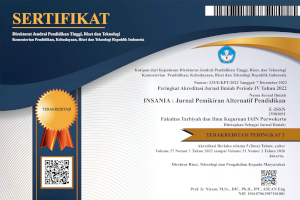The STRENGTHENING LITERATION OF CHILDREN THROUGH YOUNG WRITER CLASS PROGRAMS
DOI:
https://doi.org/10.24090/insania.v25i1.3767Keywords:
class, reinforcementAbstract
The background of this research is the low interest in reading Indonesian students as one of the literacy skills. As an alternative solution to this, effective literacy improvement programs are needed for children. This study aims to determine the effectiveness of child writer's class program as a program to strengthen children's literacy. The subjects were 20 young writer class participants at PKBM Ar Rosyid. The method used in this research is descriptive qualitative. The results showed that the child writer's class was effective in strengthening children's literacy because through an interesting learning method, the program had succeeded in publishing two anthology books written by 67 young writers.Downloads
References
Dikdasmen. 2016. Panduan gerakan Literasi Sekolah. Jakarta: Kemendikbud.
Keraf, Gorys. 2004. Komposisi. Semarang: Bina Putera.
Mangesti P.R Dwi dan Heru Subrata. 2018. “Penggunaan Media Gamelan Sederhana dalam Pembelajaran Tembang Dolanan di Kelas IV SDN Sumur Welut 1 Surabayaâ€. Jurnal PGSD. Vol. 06, No. 09, 1599-1609.
Priyatni, E. T. 2015. Desain Pembelajaran Bahasa Indonesia dalam Kurikulum 2013. Jakarta: PT Bumi Aksara.
Safitri, Laela, at.al. 2019. “Pengaruh Membaca 15 Menit Terhadap Minat Baca Siswa Sekolah Dasarâ€. Jurnal Cakrawala Pendas. Vol. 5 No. 2, 153-157.
Sugiyono. 2016. Metode Penelitian Pendidikan Pendekatan Kuantitatif, Kualitatif dan R&D. Bandung: ALFABETA.
Tarigan, H.G. 2015. Membaca Sebagai Suatu Keterampilan Berbahasa. Bandung: Angkasa.
Warsihna, Jaka. 2016. “Meningkatkan Literasi Membaca dan Menulis dengan Teknologi Informasi dan Komunikasi (TIK)â€. Jurnal Kwangsan. Vol. 4 No. 2, 67-80.
Zati, Vidya A.D. 2018. “Upaya untuk Meningkatkan Minat Literasi Anak Usia Diniâ€. Jurnal Bunga Rampai Usia Emas. Vol. 4 No. 1, 18-21.
Downloads
Published
How to Cite
Issue
Section
License
Authors who publish with this journal agree to the following terms:
Authors retain copyright and grant the journal right of first publication with the work simultaneously licensed under a Creative CommonsAttribution-ShareAlike License that allows others to share the work with an acknowledgment of the work's authorship and initial publication in this journal.
Authors are able to enter into separate, additional contractual arrangements for the non-exclusive distribution of the journal's published version of the work (e.g., post it to an institutional repository or publish it in a book), with an acknowledgment of its initial publication in this journal.
Authors are permitted and encouraged to post their work online (e.g., in institutional repositories or on their website) prior to and during the submission process, as it can lead to productive exchanges, as well as earlier and greater citation of published work (See The Effect of Open Access).








